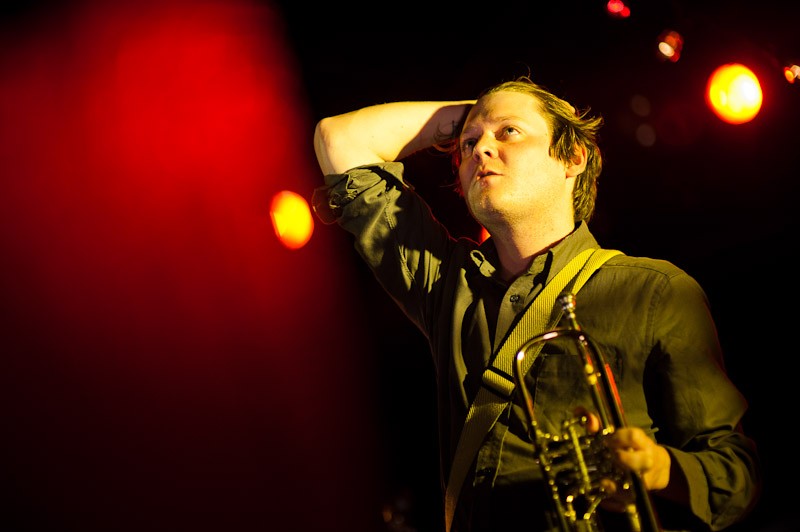Zach CondonâÄôs once solo project Beirut developed out of recordings consisting of faraway abstractions of places the young high school dropout wanted to go. Distant nostalgia first defined the bandâÄôs wistful music and lyrics. He even chose the moniker for his Balkan folk project on a whim after looking up cities he wanted to visit. Condon regaled Friday nightâÄôs First Avenue crowd with tales of old-Europe from past albums like âÄúGulag OrkestarâÄù and âÄúThe Flying Cup Club.âÄù
CondonâÄôs travels now return to his hometown of Santa Fe and highlighted his Minneapolis visit Friday evening as he âÄî he showcased music from BeirutâÄôs latest LP âÄúThe Rip Tide,âÄù exhibiting further personal immediacy compared to past albums.
As the bandâÄôs anchor, CondonâÄôs stately presence warmed the crowd at the sold-out First Avenue show. Each of the ballads âÄî accompanied by an ever-changing combination of trumpets, an upright bass, a tuba, an accordion, a ukulele and more âÄî capture classic pop and cull largely from other erasâÄô and countriesâÄô styles. But Condon remains the ubiquitous tour guide. BeirutâÄôs grandiosity never feels ostentatious like chamber music-loving contemporaries Sufjan Stevens and Owen Pallett. Tracks from âÄúThe Rip TideâÄù like âÄúGoshenâÄù and âÄúPort of CallâÄù represent CondonâÄôs vast musical influence while sounding altogether familiar. CondonâÄôs voice always reminisces with all inclusiveness. He might sing of the past, but the musicianship of his backing band keeps Condon from sounding too ethereal. And the singerâÄôs affability on stage maintains an air of universality even amidst such private songs.
Mostly Beirut sticks to waltz-driven rhythms, but CondonâÄôs experiments with the style of Mexican music on âÄúMarch of the ZapotecâÄù also seeped into the set. Since CondonâÄôs husky voice lends itself perfectly to melancholia, the cheer of the brass also tended to ease whatever formula the band naturally stands by. At times, trumpet and tuba riffs reveled in the spontaneity of jazz âÄî the instrumentation of Beirut thanks to Kelly Pratt, Ben Lanz and Perrin Cloutier constantly invigorated the crowd. For instance, CloutierâÄôs accordion comfortably awakened the upright cheeriness of a polka tune. The melding of styles and influences may not seem consistent on the surface, but Beirut operates on such cohesive levels that genres never appear piecemeal or strewn together. And âÄúThe Rip TideâÄù represents BeirutâÄôs most unified effort to date.
With âÄúThe Rip Tide,âÄù Condon also confronts the problem with BeirutâÄôs initial obsessions with history. Standout tracks like âÄúNantesâÄù and âÄúPostcards from ItalyâÄù first delineated Beirut from other contemporaries, but the nostalgia can be criticized as misplaced. Because how can a 25-year-old really reflect on early twentieth century Paris? BeirutâÄôs origins in musical globetrotting might never be satisfied since thatâÄôs nostalgiaâÄôs only promise. Condon focuses his efforts based in the present on âÄúThe Rip TideâÄù and lends perfectly to a fully-fledged live performance. While he still adheres to a formula based in combining his reverie-inducing voice with lush arrangements, CondonâÄôs longing feels much more at home. Beirut found their compass bearing.








